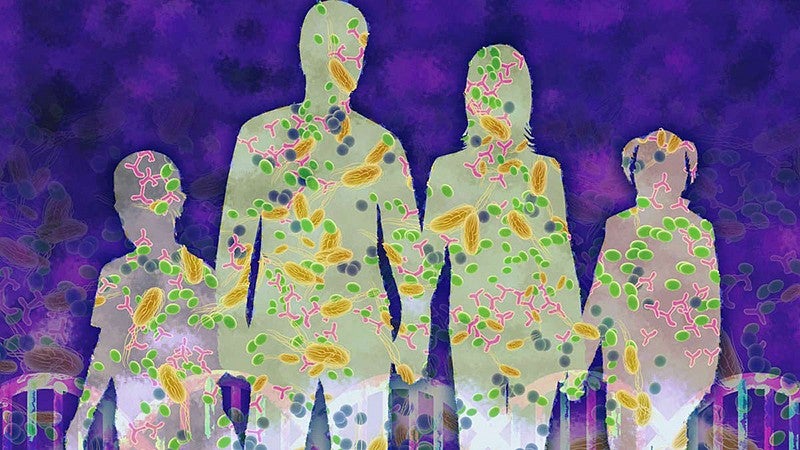Philosopher Nicolae Morar was perplexed by various metaphors tossed about by scientists studying the human microbiome. Microbiologist Brendan Bohannan was sure that thinking of the human body as an ecosystem correctly framed the research being done at the University of Oregon and elsewhere.
Three years later, after what Bohannan calls the most intensive collaboration he's ever had, the two members of the UO's Environmental Studies Program see eye to eye and, perhaps, equally changed in their assessment of a field that has exploded since the National Institutes of Health launched the Human Microbiome Project in 2007.
They've poured out a case for better framing the field's language in the June issue of the Quarterly Review of Biology. They call on scientists to be pluralistic - to keep their eyes wide open in an interdisciplinary way - and for the public to be skeptical of newly touted discoveries that promise health benefits.
"The more I started to read on this topic, the more I was troubled by the fact that there were a number of names that were given to this biological phenomenon, without appreciating what language brings to the understanding of it," Morar said. "I went to Brendan and asked why scientists were calling it both an organ and a superorganism in the same sentence."
Bohannan, an Alec and Kay Keith Professor at the UO, and Morar examined numerous metaphors. They then narrowed them into five that potentially are most useful for framing the thinking going forward: organ, immune system, superorganism, holobiont and ecosystem.
What each offers and lacks is detailed in the paper, which is freely available from the journal. An overview also is available in a news release issued by the journal.
None of the labels alone, they argued, captures the complexity of the human microbiome and its potential effects on human health. Researchers, they said, should use them for guiding their own experiments but with minds wide open to other possibilities. Interdisciplinary collaborations are crucial.
Working with Morar, Bohannan said, led him to challenge his own assumptions drawn from years as a scientist focused on microbes in the environment.
"My metaphor for the human body was that we are an ecosystem, and that our microbiome is a community within that ecosystem, like a forest within the larger ecosystem of the Northwest," he said. "With that view, we can manipulate our forest. We can restore it and manage it like a national park."
However, he said, in the human body, restoration through manipulation has limitations.
"Like in all new fields, we struggle to find language to communicate how interesting the field is and its promise to improve our overall health," Bohannan said. "In our efforts to find the right language, we unconsciously took on a lot of assumptions and philosophical baggage that goes along with that language."
The paper, Morar said, offers both an appreciation of the complexity that researchers face and a caution about their endorsing and overhyping early discoveries. It also raises a flag for the general public to also exercise caution about news reports promising healthy benefits from a study that may later not hold up as research progresses.
One example noted in the paper is the proliferation of probiotics designed to return balance to the digestive system. There is little concrete science to back up such claims, the two UO researchers noted.
"The science on the human microbiome is in its early development," Bohannan said. "There are a lot of people out there who are hungry for answers, especially about chronic conditions that traditional medicine does not yet have answers for. People are hoping the microbiome field will provide these answers."
"We are still waiting," Morar said. "More work needs to be done, especially in a new research field like the human microbiome that has not only the potential to redefine human health, but also human nature all together."
A similar call for scientific caution about communicating discoveries appeared May 27 in a commentary in the journal Nature Medicine. Researchers at the University of Chicago and the National Institutes of Health's National Human Genome Research Institute urged researchers to be careful in their communications about newly published studies so that, in turn, the public does not misinterpret the findings.







